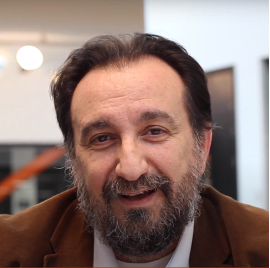Séminaire Bernoulli Lab - Année universitaire 2022-23
Notre séminaire se tient une fois tous les deux mois, en présentiel uniquement, à l'Hôtel-Dieu (amphithéâtre Dupuytren, aile A1, RdC haut), le vendredi à 14h, et il est suivi d'un moment convivial. L'inscription préalable est recommandée, et vous pouvez vous abonner à notre newsletter pour recevoir toutes les infos à ce sujet.
Mihaela van der Schaar (Cambridge)
7 octobre 2022
Panning for insights in medicine: New frontiers in machine learning interpretability and discovery
Abstract: In this talk, I will describe my vision of how machine learning (ML) will catalyze a transformation in medicine and healthcare. Such a transformation is only possible if we can distill new and useful discoveries and insights on the basis of ML. I will describe a new discovery framework which enables us to achieve this. First, current ML interpretability has focused on explaining static predictions which is not sufficient in medicine. I will thus introduce new interpretability methods for explaining time-series predictions, clustering or heterogeneous treatment effects models made by black-box ML methods. Second, I will introduce SimplEx, a user-centered method that provides example-based explanations of ML methods with reference to a set of examples freely selected by the user, called the corpus. I will show how the freedom in choosing the corpus allows users to have personalized explanations in terms of examples that are meaningful for them. Finally, I will introduce Symbolic Metamodels and D-CODE, two methods that allow unravelling the underlying equations of medicine from data, enabling scientists to make new discoveries.

Laurence Watier (Inserm & Institut Pasteur)
16 décembre 2022
Résistance bactérienne et données de santé (en français)
Résumé: Sur une période de 20 ans, l’évolution de la règlementation, des bases de données de santé disponibles, de leurs écueils et des démarches pour y accéder sera présentée au travers de 3 programmes de recherches : PhiMAC – Impact des politiques de santé publique pour le contrôle des bactéries résistantes dans la communauté ; PhiBRA – Impact médico-économique de la résistance bactérienne aux antibiotiques et BactHub – Impact de l’exposition individuelle aux antibiotiques sur les bactériémies à bactéries résistantes.

Pierre Jannin (Inserm, LTSI Rennes)
3 février 2023
Surgical Skill Analysis with Surgical Data Science
Abstract: With about 250 millions of surgical procedures worldwide per year, surgical quality is a crucial societal issue. Increasing surgical quality may occur through the whole perioperative process from diagnosis, strategy decision, planning, performance and post-operative evaluation, as well as through initial and continuous learning. Computer assistance is required at each step. In the presentation, I will present how such objectives can be addressed by studying and understanding surgical skills, following the surgical data science methodology. I will illustrate such approach by examples covering different aspects of surgical skills from technical to non-technical ones, such as the evaluation of surgical procedural skills, the development of a surgical simulation system for training procedural skills based on an interactive and collaborative virtual reality environment and the study of neurosurgical non-technical skills.

Marco Viceconti (Bologna)
7 avril 2023
Digital Health: Barriers to the Widespread Adoption of Digital Technologies in Healthcare
Abstract: Digital technologies have been kept on the margins of healthcare for too long. A new generation of technologies can collect accurate information on each patient’s health status, transform them into clinically relevant biomarkers, and offer predictive capacities that can be used as clinical decision support systems, but also to assess the safety and efficacy of new interventions. Using three guiding examples (wearables to quantify mobility in drug trials; a digital twin in healthcare for the differential diagnosis of dynapenia; an in silico trial on the effect of hip protectors) we will revise and discuss seven barriers that are slowing down the adoption of these technologies: slow development, lack of validation data collections, regulatory barriers, stakeholders’ information, scalability and computational efficiency, and training and re-training of the workforce. We will also suggest possible initiatives, some already on-going, aimed to lower such barriers and increase the adoption rate.

Daniel Rueckert (TU Munich)
2 juin 2023
AI and the future of radiology
Abstract: Artificial Intelligence (AI) is changing many fields across science and our society. This talk will discuss how AI is changing medicine and healthcare, particularly in radiology. I will focus on how AI can support the acquisition of medical images and image analysis and interpretation. This can enable the early detection of diseases and support the improved personalised diagnosis. I will show several examples of this in the talk, including neuro and cardiovascular MR imaging. Furthermore, we will discuss how AI solutions can be privacy-preserving while also providing trustworthy and explainable solutions for clinicians.
